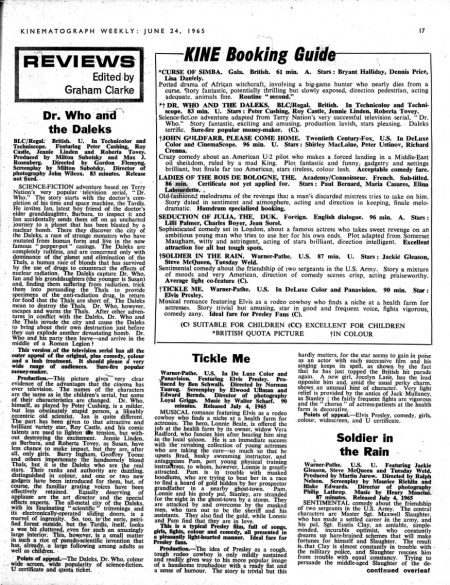Dr. Who and the Daleks (Kinematograph Weekly)
- Publication: Kinematograph Weekly
- Date: 1965-06-24
- Author: Graham Clarke
- Page: 17
- Language: English
BLC/Regal. British. U. In Technicolor and Techniscope. Featuring Peter Cushing, Roy Castle, Jennie Linden and Roberta Tovey. Produced by Milton Subotsky and Max J. Rosenberg. Directed by Gordon Flemyng. Screenplay by Milton Subotsky. Director of photography John Wilcox. 83 minutes. Release not fixed.
SCIENCE-FICTION adventure based on Terry Nation's very popular television serial, "Dr. Who." The story starts with the doctor's completion of his time and space machine, the Tardis. He invites Ian, latest boy friend of the doctor's elder granddaughter, Barbara, to inspect it and Ian accidentally sends them off on an uncharted journey to a planet that has been blasted by a nuclear bomb. There they discover the city of the Daleks, a race of strange monsters who have mutated from human form and live in the now famous "pepper-pot" casings. The Daleks are completely ruthless, and are concerned only with dominance of the planet and elimination of the Thals, a human race of blonds that has survived by the use of drugs to counteract the effects of nuclear radiation. The Daleks capture Dr. Who. Ian and his granddaughters (the younger is Susan) and, finding them suffering from radiation, trick them into persuading the Thals to provide specimens of the anti-radiation drug, in return for food that the Thals are short of. The Daleks mean to destroy the Thals. Dr. Who, however, escapes and wams the Thals. After other adventures in conflict with the Daleks, Dr. Who and the Thals invade the city and cause the Daleks to bring about their own destruction just before they can explode another devastating bomb. Dr. Who and his party then leave—and arrive in the middle of a Roman Legion !
This version of the television serial has all the outer appeal of the original, plus comedy, colour and a lush treatment. It should please a very wide range of audiences. Sure-fire popular money-maker.
Production.—This picture gives very clear evidence of the advantages that the cinema has over television. The names of the characters are the same as in the children's serial, but some of their characteristics are changed. Dr. Who. himself, as played by Peter Cushing. is a milder. but less obstinately stupid person, a likeably eccentric old scientist. Ian is quite different. The part has been given to that attractive and brilliant variety star, Roy Castle, and his comic talents are used to lighten the tension, but without destroying the excitement. Jennie Linden, as Barbara, and Roberta Tovey. as Susan, have less chance to make impact, but they are, after all, only girls. Barry Ingham, Geoffrey Toone and others impersonate the handsomely blond Thals, but it is the Daleks who are the real stars. Their ranks and authority are dazzling, distinguished in colour, and one or two new gadgets have been introduced for them, but, of course, the familiar grating voices have been effectively retained. Equally deserving of applause are the art director and the special effects experts. The all-metal city of the Daleks. with its fascinating "scientific" trimmings and its electronically-operated sliding doors, is a marvel of ingenuity. So, too. is' the eerie, petrified forest outside, but the Tardis, itself, looks a wee bit cluttered, even for such an amazingly large interior. This, however, is a small matter in such a riot of pseudo-scientific invention that has, already, a large following among adults as well as children.
Points of appeal--The Daleks, Dr. Who, colour wide screen, wide popularity of science-fiction. U certificate and quota ticket.
*† DR. WHO AND THE DALEKS. BLC/Regal. British. In Technicolor and Techniscope. 83 min. U. Stars : Peter Cushing, Roy Castle, Jennie Linden, Roberta Tovey. Science-fiction adventure adapted from Terry Nation's very successful television serial, "Dr. Who." Story fantastic, exciting and amusing, production lavish, stars pleasing. Daleks terrific. Sure-fire popular money-maker. (C).
Disclaimer: These citations are created on-the-fly using primitive parsing techniques. You should double-check all citations. Send feedback to whovian@cuttingsarchive.org
- APA 6th ed.: Clarke, Graham (1965-06-24). Dr. Who and the Daleks (Kinematograph Weekly). Kinematograph Weekly p. 17.
- MLA 7th ed.: Clarke, Graham. "Dr. Who and the Daleks (Kinematograph Weekly)." Kinematograph Weekly [add city] 1965-06-24, 17. Print.
- Chicago 15th ed.: Clarke, Graham. "Dr. Who and the Daleks (Kinematograph Weekly)." Kinematograph Weekly, edition, sec., 1965-06-24
- Turabian: Clarke, Graham. "Dr. Who and the Daleks (Kinematograph Weekly)." Kinematograph Weekly, 1965-06-24, section, 17 edition.
- Wikipedia (this article): <ref>{{cite news| title=Dr. Who and the Daleks (Kinematograph Weekly) | url=http://cuttingsarchive.org/index.php/Dr._Who_and_the_Daleks_(Kinematograph_Weekly) | work=Kinematograph Weekly | pages=17 | date=1965-06-24 | via=Doctor Who Cuttings Archive | accessdate=22 December 2025 }}</ref>
- Wikipedia (this page): <ref>{{cite web | title=Dr. Who and the Daleks (Kinematograph Weekly) | url=http://cuttingsarchive.org/index.php/Dr._Who_and_the_Daleks_(Kinematograph_Weekly) | work=Doctor Who Cuttings Archive | accessdate=22 December 2025}}</ref>
